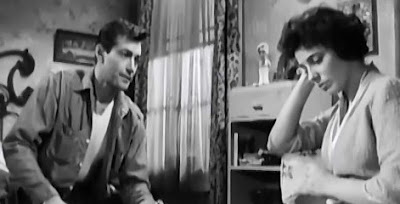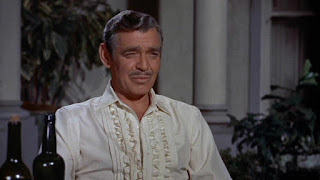 |
| Michael Fox and Lex Barker |
THE GIRL IN THE KREMLIN (1957). Director: Russell Birdwell.
Joseph Stalin (Maurice Manson) has faked his death with a lookalike corpse, changed his face via plastic surgery, and is hiding out in Greece with associate and assassin Igor Smetka (Michael Fox of
The Lost Planet) and his nurse Miss Gresenko (Zsa Zsa Gabor). This woman is the twin of Lily Gresenko (also Gabor) -- the two women were separated and one was taken to Moscow some years before. Lily desperately wants to find her sister, and hires callous private eye Steve Anderson (Lex Barker of
Tarzan's Savage Fury) for the job until he deems it too impossible to finish. Importuned by Lily to continue, he teams up with an old friend, a one-armed agent named Mischa (Jeffrey Stone of
Money, Women, and Guns). Learning that the monster Stalin may be alive, and that Lily's sister may be with him, the hunt is on. But others are aware of this search, and are going to do their best to stop it, by murder and kidnapping if necessary.
 |
| Zsa Zsa gives two mediocre performances |
The Girl in a Kremlin is a lurid melodrama that is caught somewhere between being a serious, if far-fetched, spy thriller and a wild, rather absurd
Man from UNCLE episode. Zsa Zsa Gabor, never much of an actress although they kept giving her parts, is slightly better as the Stalin associate than she is as the concerned Lily, but that's not saying much. Lex Barker doesn't put himself out too much, playing the role in a flippant style that makes you wonder why his character bothers doing anything. Jeffrey Stone, the model for Disney's Prince Charming, is much better as the attractive and very appealing Mischa. Perennial supporting player Michael Fox has a good role as an assassin who carries a bullet-firing umbrella, and Maurice Manson is effective as Stalin, and even more so in his new identity, which I won't reveal here.
 |
| Jeffrey Stone and Lex Barker |
William Schallert also gives a good performance as Stalin's son, Yakov, who somehow survived his death in a German concentration camp after his father sent him to the front and refused a prisoner exchange that would have brought him home! Norbert Schiller (of
The Return of Dracula) scores as Brubov, who is told he must kill Steve if he wants to see his wife and boys again, and dresses up as a nun to carry out his assignment. Elena Da Vinci makes a sinister, whip-wielding Olga, Smetka's wife, and Phillipa Fallon sneers competently as her associate, Nina. At one point Steve is whipped by Olga. Meanwhile Zsa Zsa has a cat fight with herself.
 |
| Natalie Daryll gets her head shaved |
One cast member you can only feel pity for is Natalie Daryll, who plays Russian prisoner, Dasha. In an early, protracted sequence, she has her locks shorn and head shaved in almost pornographic detail, right down to the use of a straight razor and shaving cream. This whole business is not faked and one can only hope the poor woman was well paid for this disturbing exhibition. This was her first and last movie; and she had only two TV credits afterwards. The whole sequence is rather pointless aside from illustrating Stalin's weird tastes and cruelty. As for the movie, it is strangely compelling and entertaining if impossible to take entirely seriously. DeWitt Bodeen was one of the screenwriters. No composer is credited, but the score, presumably stock music, really helps put the movie over.
Verdict: Here's a strange one! ***.

















































